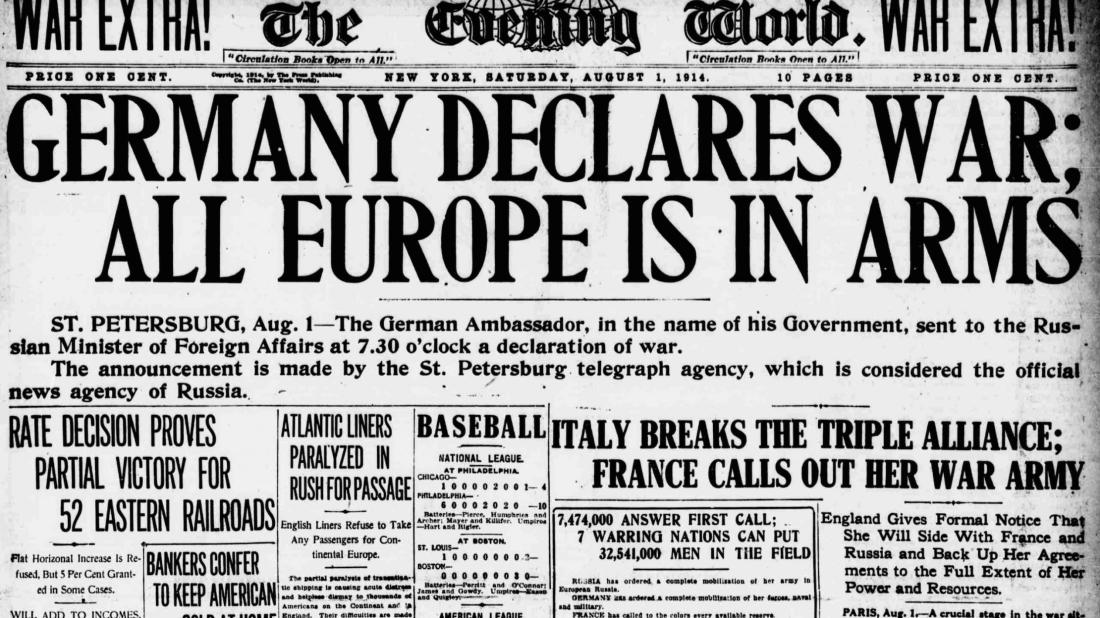
The Assassination That Set off WWI
This year marks the 100th anniversary of the end of WWI. One of would imagine that the year would have been full with celebrations, memorials, and other ways to honor those who served and those who never came home. But just how much have we heard about WWI this year? Outside of threats to tear down memorials to those who died in the War to End All Wars . . . Not much.
It is our goal, then, to spend the time between now and November 11, recounting the events of WWI. We’d also like to hear stories of WWI heroes, if anyone is willing to offer some up.
The war was set off by one of the most infamous assassinations in all of history. On June 28, 1914, Archduke Franz Ferdinand, heir to the Austro-Hungary throne, and his pregnant wife, Sophie, were shot. “Taking place against a backdrop of escalating tensions in the Balkans, the assassination set off a chain of events that would lead to the start of World War I barely one month later” (Source). The event was planned out by a group of Serbian terrorists, The Black Hand, and executed by Bosnian Gavrilo Princip.
At the time, Ferdinand and his wife had been reviewing his uncle’s imperial armed forces in Bosnia and Herzegovina. Bosnia and Herzegovina had formerly been Ottoman territories, but were annexed by Austria-Hungary in 1908 “to the indignation of Serbian nationalists, who believed they should become part of the newly independent and ambitious Serbian nation” (Source). S0, although Serbia had benefited greatly from the two Balkan Wars, Serbian nationalists wanted to “liberate” the South Slavs in Austria-Hungary. At the head of the Serbian military intelligence was a man named Col. Dragutin Dimitrijević. Dimitrijević was also the head of the secret society Union or Death, which “pledged to the pursuit of this pan-Serbian ambition” (Source).
Union or Death or Black Hand, was founded in 1911 by army officers and government officials with the sole intent of liberating the Serbs “outside Serbia from Habsburg or Ottoman rule” through the use of terrorist methods (Source). They were instrumental in the planning of the assassination of archduke Ferdinand.
It just so happened that June 28 was not only the Archduke Ferdinand’s anniversary, but also the anniversary of the First Battle of Kosovo in 1389. And, although Serbs did not actually lose it’s independence until the Second Battle of Kosovo in 1448, the day was of great significance to Serbian nationalists, “and one on which could be expected to take exception to a demonstration of Austrian imperial strength in Bosnia” (Source).
Princip was actually the second assassination attempt that day. Black Hand’s first attempt backfired. Earlier, Archduke Ferdinand and Sophie had been riding in an open car, “with surprisingly little security, when Serbian nationalist Nedjelko Cabrinovic threw a bomb at their car; it rolled off the back of the vehicle and wounded an officer and some bystanders” (Source). Later in the day, the couple was going to visit the injured officer, when their driver took a wrong turn. Princip happened to be loitering there and decided to take a chance. He was successful.
An unfortunate scene followed: the crowd was so focused on Princip that Archduke Ferdinand and Sophie “lay fatally wounded in their limousine as it rushed to seek their help; they both died within the hour” (Source).
[Below: The assassination of Archduke Franz Ferdinand]

With the assassination, Austria-Hungary obviously blamed the Serbian government and wanted to declare war. They figured that now was as good a time as any to settle the question of Slav nationalism.
However, prior to this, a number of defense alliances had been set up all around Europe. These basically stated that should one country declare wars, the other countries would have to come to its aid. For example, Britain, France, Ireland, and Russia had all signed a treaty called the Triple Entente. Meanwhile, Germany and Austria-Hungary had formed an alliance known as the Central Powers.
Russia was quick to support Serbia (the aggressors), and were ready to make a declaration of war. But before Austria-Hungary could declare war on Serbia, they needed the reassurance that Germany would support them in war.
July 23rd saw the beginning of “Black Week.” Austria-Hungary set Serbia a list of demands, but Serbia’s response wasn’t satisfactory. So, on July 28, Austria-Hungary declared war on Serbia. The tenuous peace amongst Europe’s great powers had finally collapsed. The next day, “Austro-Hungarian forces began to shell the Serbian capital of Belgrade, and Russia, Serbia’s ally, ordered a troop mobilization against Austria-Hungary” (Source). By the 1st of August, France, too, had begun to mobilize it’s troop; it supported Russia. Meanwhile, Germany had declared war on Russia. On August 3rd, Germany and France had declared war on each other. That very night, Germany crossed into neutral Luxembourg, invading them. This prompted Britain to declare war on Germany. Europe was at war.
[Below: Newspaper article at the outbreak of the war]

Up Next: The Battle of Mons (1914)
